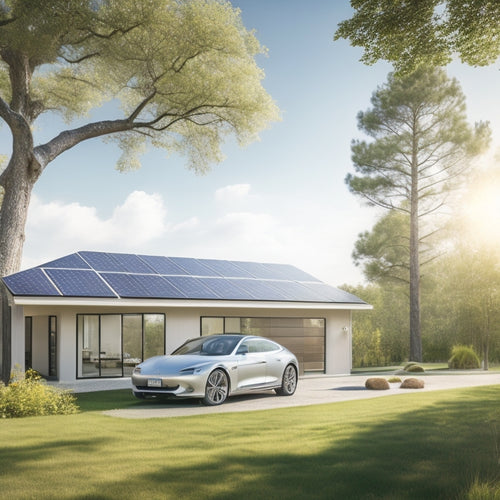
Why Commercial Solar Panel Installation Costs Vary
Share
As you explore commercial solar panel installation, you'll find that costs vary substantially. Your system's size and complexity, including equipment and labor requirements, impact the final bill. Location and climate also play a crucial role, as regions with intense sunlight or harsh weather conditions require tailored solutions. The installation company's expertise, local incentives, and policy variations further influence the cost. Even the quality of equipment, such as high-efficiency panels and advanced inverters, affects the bottom line. With so many factors at play, you must consider each component to optimize your investment - and there's more to discover about how these elements intersect.
Key Takeaways
• System size and complexity, including equipment, labor, and materials, significantly impact commercial solar panel installation costs.
• Location and climate factors, such as sunlight patterns, temperatures, and weather conditions, affect system performance and cost.
• Installation company and labor costs vary depending on the provider's experience, certifications, and warranty offerings.
• Government incentives and policy variations at federal, state, and local levels substantially impact the overall cost of commercial solar panel installation.
• Equipment quality and technology, including high-efficiency solar panels and advanced inverters, influence energy output, maintenance needs, and overall cost.
System Size and Complexity
The size and complexity of your commercial solar panel installation substantially impact the overall cost, with larger, more intricate systems requiring more equipment, labor, and materials.
As you consider your system design, you'll want to optimize energy efficiency to maximize your return on investment. A well-designed system won't only reduce your energy bills but also increase your property value.
When it comes to system complexity, the number of panels, inverters, and mounting structures all contribute to the final cost.
A more complex system may require additional hardware, such as trackers or energy storage systems, which add to the expense. However, these advanced features can also substantially improve energy efficiency, making them a worthwhile investment in the long run.
To strike the right balance between cost and energy efficiency, you need to work with an experienced installer who can assess your energy needs and design a system that meets your unique requirements.
Location and Climate Factors
Your commercial solar panel installation's location and climate substantially influence its performance and cost, as varying sunlight patterns, temperatures, and weather conditions across different regions affect energy output and system durability.
For instance, installations in regions with high temperatures and intense sunlight, like the southwestern United States, may require more robust systems to guarantee peak performance.
On the other hand, regions with mild weather patterns, like the Pacific Northwest, may benefit from more efficient systems.
Weather patterns also play a significant role in determining the cost of your commercial solar panel installation.
Regions prone to heavy snowfall or high winds may require additional structural reinforcements, increasing the overall cost.
Additionally, regional regulations can impact the cost of your installation.
For example, some states offer incentives for businesses that invest in renewable energy, reducing the upfront cost.
Understanding the specific climate and regional regulations of your location is vital in determining the most cost-effective and efficient solar panel installation for your business.
Installation Company and Labor
You'll also need to factor in the installation company and labor costs, which can vary substantially depending on the provider's experience, certifications, and warranty offerings. A reputable installer with a proven track record will typically charge more than a newcomer to the industry. Additionally, the complexity of the installation, such as the need for special permits or custom designs, can impact labor costs.
| Installer Qualities | Impact on Labor Costs |
| Industry certifications (e.g., NABCEP) | Higher costs due to increased expertise |
| Workforce expertise (e.g., electrical engineers) | Higher costs due to specialized labor |
| Warranty and maintenance offerings | Higher costs due to extended support |
| Permitting processes (e.g., expedited permits) | Higher costs due to streamlined processes |
A seasoned installer with a skilled workforce will likely charge more than a company with less experience. In addition, the permitting processes can also influence labor costs. For instance, an installer with established relationships with local authorities may be able to expedite permits, increasing labor costs. When evaluating installation companies, consider the value of their expertise and the potential long-term benefits of their services.
Incentives and Policy Variations
Government incentives and policy variations at the federal, state, and local levels can substantially impact the overall cost of commercial solar panel installation, with some programs offering rebates, tax credits, or exemptions that can help offset the upfront investment.
As you navigate the complex landscape of incentives, you'll find that tax credits, in particular, can be a vital factor in reducing costs. The Solar Investment Tax Credit (ITC), for instance, allows you to claim a credit of up to 26% of the total project cost.
Additionally, state mandates and renewable portfolio standards (RPS) can drive demand for solar energy, leading to increased adoption and economies of scale.
Some states offer their own incentives, such as rebates or grants, to encourage businesses to go solar. You may also benefit from state-level tax credits or exemptions, which can further reduce your costs.
Understanding the specific incentives available in your region is essential to maximizing your savings. By taking advantage of these policy variations, you can substantially reduce the cost of your commercial solar panel installation and boost your return on investment.
Equipment Quality and Technology
High-efficiency solar panels and advanced inverters can substantially impact the overall cost of commercial solar panel installation, as superior equipment quality and cutting-edge technology can increase energy output and reduce maintenance needs.
When you invest in high-efficiency solar panels, you're getting the most out of every sunbeam that hits your roof. Look for panels with high efficiency ratings, typically above 20%. This means they can convert more sunlight into electricity, resulting in higher energy output and lower costs.
Your inverter choice also plays a significant role in the overall cost and performance of your solar panel installation.
You have three main inverter types to choose from: string inverters, microinverters, and power optimizers. String inverters are the most common and cost-effective option, but microinverters and power optimizers offer more flexibility and monitoring capabilities.
Keep in mind that advanced inverter technology can increase upfront costs, but they often provide better performance and longer lifetimes. By selecting high-quality equipment, you can enjoy improved energy production, reduced maintenance, and a faster return on investment.
Frequently Asked Questions
How Long Does a Typical Commercial Solar Panel Installation Take?
You're wondering how long a typical commercial solar panel installation takes? It usually spans 2-6 months, depending on the project timeline, which involves installation phases, workforce size, site preparation, and the permitting process, all affecting the overall duration.
Can I Install Solar Panels on a Roof With Multiple Skylights?
When evaluating your roof for solar panels, you'll need to examine skylight placement and potential roof obstructions, as they can impact the installation's efficiency and overall cost, so assess these factors beforehand to ensure a successful project.
Are Commercial Solar Panels Compatible With All Electrical Systems?
You'll find that commercial solar panels are compatible with most electrical systems, but system integration can be tricky, especially when dealing with voltage fluctuations, electrical harmonics, and power quality issues, requiring careful consideration to achieve grid parity.
Can I Add More Panels to My Existing Commercial Solar System?
You can expand your existing commercial solar system by adding more panels, enabling energy expansion through system upgrades, but verify compatibility with your current infrastructure and local building codes before making any changes.
Do Commercial Solar Panels Require Regular Maintenance Checks?
You'll want to schedule regular maintenance checks to guarantee your commercial solar panels operate at peak panel efficiency, guaranteeing system reliability and maximizing energy production, so you can reap the benefits of your investment.
Related Posts
-

Why Invest in Solar Car Battery Chargers Online?
By investing in a solar car battery charger online, you're not only reducing your reliance on fossil fuels but also o...
-

Top Portable Solar Panels for Cars to Buy Online
When shopping for portable solar panels for your car, you'll want to take into account reputable brands like Renogy, ...
-

Safely Staying on Course: 5 Essential Lane Tips
You're about to take your driving skills to the next level by mastering the art of staying in your lane. First, inves...


